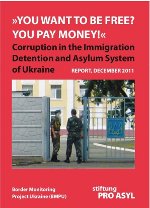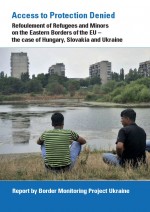After Tampere and The Hague, the Stockholm program will constitute the next 5-year-framework for Justice and Home Affairs (JHA) within the EU and its member states. The new program claims to build up the ‘area of freedom, justice and security’, but in fact it will continue to implement an even tighter regime of surveillance and control and will promote a securitisation of social life, undermining all civil rights and privacy despite contrary claims. On monday the 30th of november and tuesday the 1st of december a number of actions and other events was held in Brussels to protest against this new 5 year programme of death and detention.
The bordermonitoring project participated in these protests and published a press release:
Press Statement
Brussels, 30 November 2009
So far, the case of the Eastern borders of the European Union raises less attention than the southern sea borders. This is because the situation on the land borders is less dramatic, less visible and less tragic as few refugees and other vulnerable migrants lose their life in search of protection. The situation in the borderlands of Ukraine, Hungary and Slovakia, however, raises major concerns.
Large-scale unlawful return from Hungary and Slovakia
In 2006, according to Ukrainian authorities, 1,400 asylum seekers were refused access to protection in Hungary and Slovakia and unlawfully returned to Ukraine.
- In June 2008, a young Somali man, age 22, crossed the border to Hungary illegally and was apprehended. He claimed international protection, “please, help” he asked. Within 12 hours he was returned to Ukraine. There he was held at a border guard station for 48 hours, insulted and beaten. Subsequently, he was detained for a total of 8 month.
- In June 2009, an Afghan boy, age 16, half-orphan, entered Hungary clandestinely with the aim to find international protection. He was apprehended by the policy, interrogated by border police, and returned to Ukraine within 24 hours. There he has no relatives, is placed in a refugee reception centre where he receives no counseling or schooling.
- In July 2009, a young Somali girl, age 16, entered Hungary clandestinely from Ukraine. She was apprehended and applied for asylum; nevertheless she was returned back to Ukraine within 24 hours.
Unviable conditions for refugees and other vulnerable migrants in Ukraine
In Ukraine, the asylum system is corrupt and asylum seekers have to pay bribes at any stage; recognition rates are as low is 1-3 percent; there is no subsidiary protection for refugees from war regions. Asylum seekers and refugees have no or limited access to regular housing, health care, benefits of any kind, regular employment, education or language classes. Clandestine border crossers are detained for six month and even beyond the legal maximum indiscriminately whether they are refugees or economic migrants. Standards of detention facilities are often in violation of human rights. For example, Chop detention centre holds 33 detainees in a 25 m² room who share 16 beds; there is only one toilet but no bathroom. Food rations are on less than €1/day and detainees are generally malnourished.
Conclusion
Asylum seekers and other vulnerable migrants in need of international protection, including unaccompanied minors and young women are frequently pushed back from Hungary and Slovakia to Ukraine. This is a gross violation of the Geneva refugee convention as well as the UN Convention on the Rights of the Child. Ukraine is not a safe country for asylum seekers, refugees and other vulnerable migrants and they should not be returned to Ukraine.



